Recently, the pro-abortion media failed to come to the defense of pro-life authors after SagePub retracted three of their studies for allegedly failing to disclose “conflicts of interest.” And yet, a recently released abortion study published in the journal “Nature Medicine” (which purportedly showed that telehealth abortions posed few health risks) was authored and funded by organizations which heavily support abortion — and failed to fully disclose these conflicts of interest.
Is there a double standard at play?
A Double Standard in Abortion Studies?
The study “Effectiveness and safety of telehealth medication abortion in the USA,” was authored by abortion activists associated with the pro-abortion group Advancing New Standards in Reproductive Health (ANSIRH), the University of California, and other pro-abortion groups. It used data from the California Home Abortion by Telehealth (CHAT) study. More on that later.
The “Effectiveness” study only disclosed a conflict with one author. Yet, just days ago, SagePub made the decision to retract three studies from authors which had “affiliations with pro-life advocacy organizations” including the Charlotte Lozier Institute (CLI). The journal claimed (among other things) that these authors allegedly failed to disclose “conflicts of interest.”
Sage’s retraction was criticized by CLI as an “assault on science” and the organization denied that they failed to properly disclose conflicts. The retraction was viewed by many as questionable, because two of the years-old studies are cited by plaintiffs in the Alliance for Hippocratic Medicine [AHM] v. Food and Drug Administration (FDA) lawsuit, which calls into question the 2000 approval of the abortion pill (mifepristone) by the FDA. In addition, both studies were later cited in the decision by District Court Judge Matthew J. Kacsmaryk to suspend FDA approval of the drug.
That case is set to be heard before the Supreme Court in March.
Ironically, even though ANSIRH’s telehealth abortion study is being touted as a response to AHM’s lawsuit, its “conflicts of interest” have not been scrutinized, until now…
The new study comes just weeks before the Supreme Court is scheduled to hear a case that could jeopardize mifepristone’s FDA approval.
It's time SCOTUS face what we know from research: Abortion care is safe & effective when provided through telehealth. https://t.co/b9AJBlkOFA
— ANSIRH (@ANSIRH) February 18, 2024
Do the Authors Have Conflicts of Interest?
The telehealth abortion study authors include Ushma D. Upadhyay, Leah R. Koenig, Karen Meckstroth, Jennifer Ko, Ena Suseth Valladares, and M. Antonia Biggs. According to the disclosures, other than Karen Meckstroth, the authors declared “no competing interests.”
But is this true?
“K.M. reports receiving personal fees from Danco Laboratories, a distributor of mifepristone, for stafing a US Food and Drug,” the authors wrote.
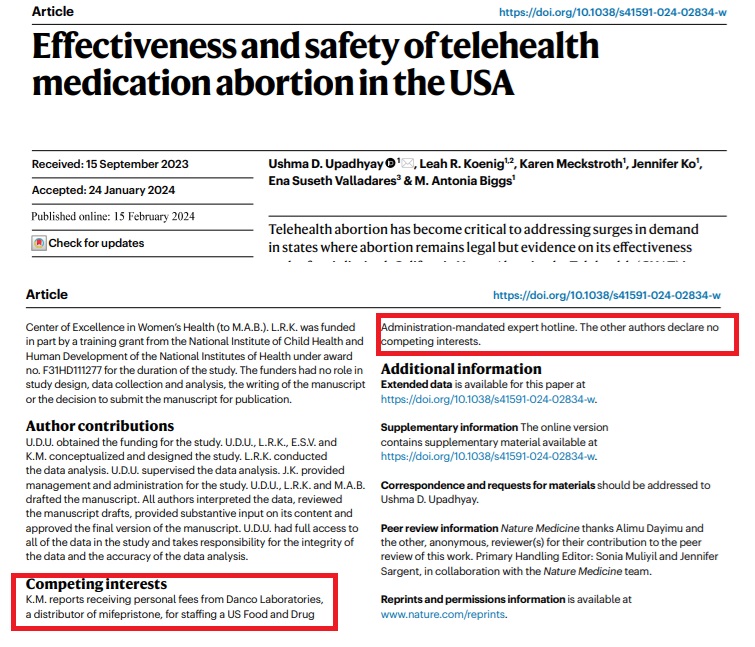
Telehealth abortion study claimed just one conflict of interest
But was the same standard used by Sage to retract the study by pro-life authors applied to this study?
Sage claimed that “all but one of the article’s authors had an affiliation with one or more of Charlotte Lozier Institute, Elliot Institute, and American Association of Pro-Life Obstetricians and Gynecologists, all pro-life advocacy organizations…”
Yet, all of the authors listed in the telehealth abortion study are connected to heavily pro-abortion groups as we detail below:
Author Karen Meckstroth is the only one to disclose conflicts of interest. Meckstroth has received “personal fees” from Danco and has been listed as a “consultant” of Danco. She is on staff at UCSF and is the director of Women’s Options Center, an abortion facility which commits abortions up to the 23rd week of pregnancy. It was also one of the sites for a pharmacy-dispensed abortion pill clinical trial.
Author Ushma Upadhyay is an associate professor at UCSF’s Advancing New Standards in Reproductive Health (ANSIRH). ANSIRH is part of UCSF’s Bixby Center for Global Reproductive Health (more on ANSIRH below). In 2019, well before the COVID-19 pandemic, Upadhyay advocated a “no test/no touch” protocol for the abortion pill, which eliminated important preliminary labs, testing, and ultrasounds — potentially placing women in harm’s way.
Upadhyay has argued that the FDA should “remove as many barriers as possible” on the abortion pill and she is far from unbiased on the issue, writing on Twitter/X in 2021: “It’s worth trying every tool we’ve got to enable all states to benefit from FDA’s recent decision allowing mail-order pharmacies to dispense abortion pills….”
Upadhyay is also working on a study for “late period pills” which, according to her protocol, “involves taking 3 doses of misoprostol” and attempts to conflate a late period with chemical abortion:
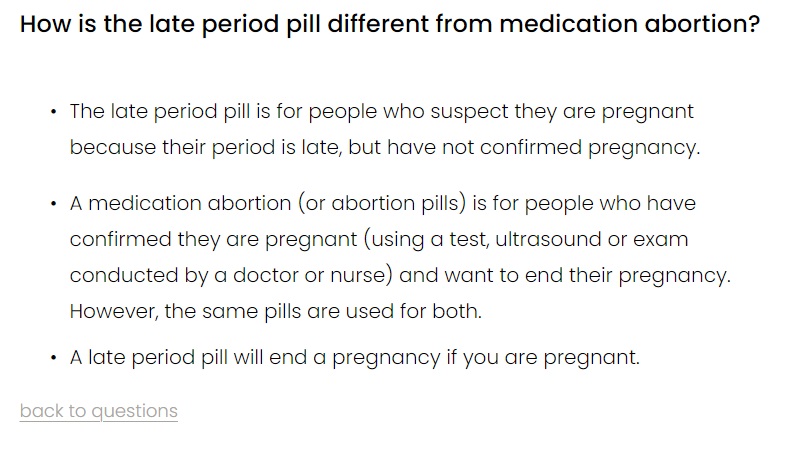
Late Period Pill is an abortion
Author Leah R. Koenig is a data analyst with ANSIRH, who previously worked at the Bill and Melinda Gates Foundation. The Gates Foundation is a significant funder of DKT International, which markets abortion pills worldwide. Koenig’s LinkedIn page reveals she has also worked for the pro-abortion Guttmacher Institute as well as the Population Council.
Koenig also received financial support for CHAT from the Society of Family Planning (SFP). Live Action News previously documented that SFP was founded in 2005 with a generous contribution from the Packard Foundation and receives millions from the Buffett Foundation. Over past years, abortion philanthropist and abortion pill investor Warren Buffett (the Susan Thompson Buffett Foundation) has poured over $15.3 million into SFP.
“Telehealth can bring an otherwise impossible abortion within reach…,”Koenig wrote in an op-ed she penned with Upadhyay.
Author Ena Suseth Valladares is a program director with “California Latinas for Reproductive Justice, Los Angeles, CA, USA” which advocates online that the “right to choose and access to the abortion healthcare services” is “fundamental to our struggle for Reproductive Justice.”
Author M. Antonia Biggs is a researcher at ANSIRH, while author Jennifer Ko is with the Department of Obstetrics, Gynecology, and Reproductive Sciences at the previously mentioned University of California, San Francisco.
This is huge.!!! F.D.A. Will Permanently Allow Abortion Pills by Mail https://t.co/GAi9yeRSlD
— Antonia Biggs (@BiggsAntonia) December 16, 2021
Advancing New Standards in Reproductive Health (ANSIRH)
While SagePub retracted three studies surrounding alleged conflicts to associations with pro-life groups, other journals seem to believe that associations with pro-abortion groups are not a cause for retraction.
Two of those study authors are affiliated with Advancing New Standards in Reproductive Health (ANSIRH) which has an undeniably strong pro-abortion bias. The organization was founded by abortionist Felicia H. Stewart (previously awarded by the Population Council), who served on the executive committee of the ARHP and boards of NARAL and the National Abortion Federation. She was medical director and staff physician at Planned Parenthood facilities in California.
ANSIRH is part of UCSF’s Bixby Center for Global Reproductive Health. The Bixby Center prides itself on abortion as a focus and claims that their work has “led to new methods of abortion and expanded the abortion care workforce.” Bixby trains abortion providers though its Ryan Residency Training Program.
“In 2002, the Bixby Center launched the [ANSIRH] Program… to enhance access to abortion. With seed funding from the Packard Foundation, ANSIRH established a Planned Parenthood training site for motivated residents and practicing physicians to learn early abortion procedures,” the Bixby Center for Global Reproductive Health claims online.
To recap, ANSIRH was established to “enhance access to abortion.”
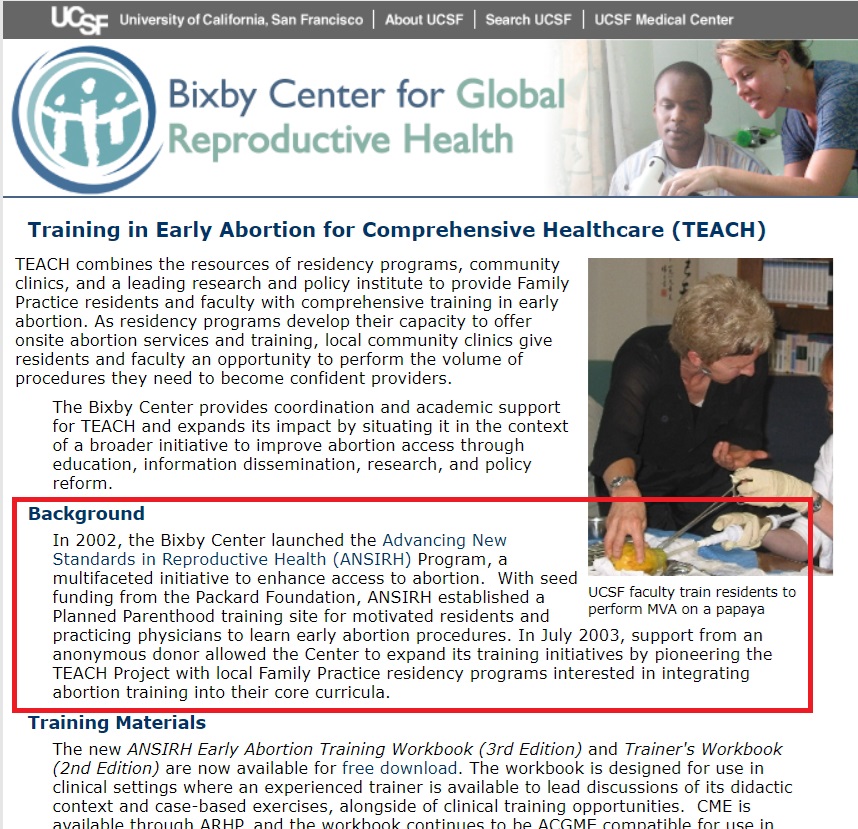
ANSIRH launched by Bixby funded by Packard mission enhance access to abortion
“In July 2003, support from an anonymous donor allowed the Center to expand its training initiatives by pioneering the TEACH Project…” the Bixby website claimed.
TEACH is an acronym which stands for Early Abortion Training Curriculum. It was established in 2003 with financial help from the Packard Foundation, an early investor in the abortion pill. TEACH workbooks are described as an “all-inclusive curriculum with tools to train new abortion providers.” The curriculum’s website admits that it received “unrestricted educational funding… by GenBioPro and Danco…” and has for years. GenBioPro and Danco oversee manufacturing of the abortion pill (mifepristone) in the United States.
Bixby and ANSIRH are both funded by the David and Lucile Packard Foundation, which seeded the abortion pill manufacturer Danco Laboratories with a $14 million investment in its early days.
ANSIRH has been funded by the William and Flora Hewlett Foundation which gives millions of dollars to abortion groups like NARAL, Planned Parenthood and the National Abortion Federation. They fund Gynuity Health Projects, UCSF, and the Guttmacher Institute. A stated goal of Hewlett has been “to expand access to abortion.”
UCSF’s California Home Abortion by Telehealth (CHAT) Study
As previously mentioned, the data from the UCSF CHAT study was used in the “Effectiveness and safety of telehealth medication abortion in the USA,” recently touted by the pro-abortion mainstream media.
The authors of the “Effectiveness” study noted: “In this study, we used data from the California Home Abortion by Telehealth (CHAT) study to follow a large sample of patients across the US from three virtual clinics to estimate the effectiveness and safety of medication abortion care provided via telehealth.”
Live Action News previously documented that the CHAT study was sponsored by University of California San Francisco (UCSF), and recruited “females ages 13 years and up.” It was overseen by ANSIRH researchers Ushma Upadhyay (also an author of the “Effectiveness” study) and Jennifer Ko. According to a separate study, “The CHAT Study began in California and increased in scope as virtual clinics expanded to provide care in 20 states and Washington, DC.”
Again, the University of California system is heavily funded by the Packard Foundation as well as the Buffett Foundation; and again, both were large investors in abortion pill manufacturer, Danco Laboratories. Vox has claimed that “Warren Buffett is the largest philanthropic funder of abortion groups in the US… he has poured more than $4 billion into reproductive rights, including abortion-specific groups, since 2000.” Packard is also investing millions into the generic version abortion pill made by GenBioPro.
UCSF has long history in pushing abortion and UC has even honored “abortion pioneers.” UCSF is involved in efforts to remove FDA safety requirements (REMS), sponsoring clinical trials to expand use of abortion pills. UC is funded by known population control advocates as well as original investors (Packard) in the abortion pill.
CHAT Study was Funded by Pro-Abortion Philanthropists
“The CHAT study was supported by the BaSe Family Fund, the Erik E. and Edith H. Bergstrom Foundation, the Isabel Allende Foundation, Jess Jacobs, the Kahle/Austin Foundation, the Lisa and Douglas Goldman Fund, Preston-Werner Ventures (all to U.D.U.) and a Resource Allocation Program Award from the University of California, San Francisco National Center of Excellence in Women’s Health (to M.A.B.),” the authors wrote.
Erik E. and Edith H. Bergstrom Foundation’s LinkedIn page claims they are “committed to working with organizations that safeguard and bolster the sexual and reproductive health and rights” and that they “partner with large international organizations, like MSI Reproductive Choices, FOS Feminista, International Planned Parenthood Federation, Ipas, and others…” The Foundation’s tax filings reveal they grant money to DKT International, a global abortion pill supplier, among others.
Isabel Allende Foundation grants dollars to secure “reproductive rights” to organizations such as Planned Parenthood and NARAL Pro-Choice America, among others.
Preston-Werner Ventures has commited to “providing USD 1 million per year over the period of 2022-2025 towards the global goal of universal access to sexual and reproductive health and rights by 2030.”
The Lisa and Douglas Goldman Fund lists “Reproductive Health & Rights” as its priority with a goal to “Protect and expand access by strengthening the abortion service delivery ecosystem.” The Fund recently awarded “$1,000,000 in emergency grants to seven organizations providing immediate assistance to women who reside in states where abortion is now outlawed or restricted.” Their “strategies” include “Advanc[ing] and expand[ing] access to medication abortion,” to “Improv[ing] abortion seekers’ ability to access care,” to “Promot[ing] activities that increase abortion provider training” and to “Support[ing] Northern California-based health clinics that offer abortion services.”
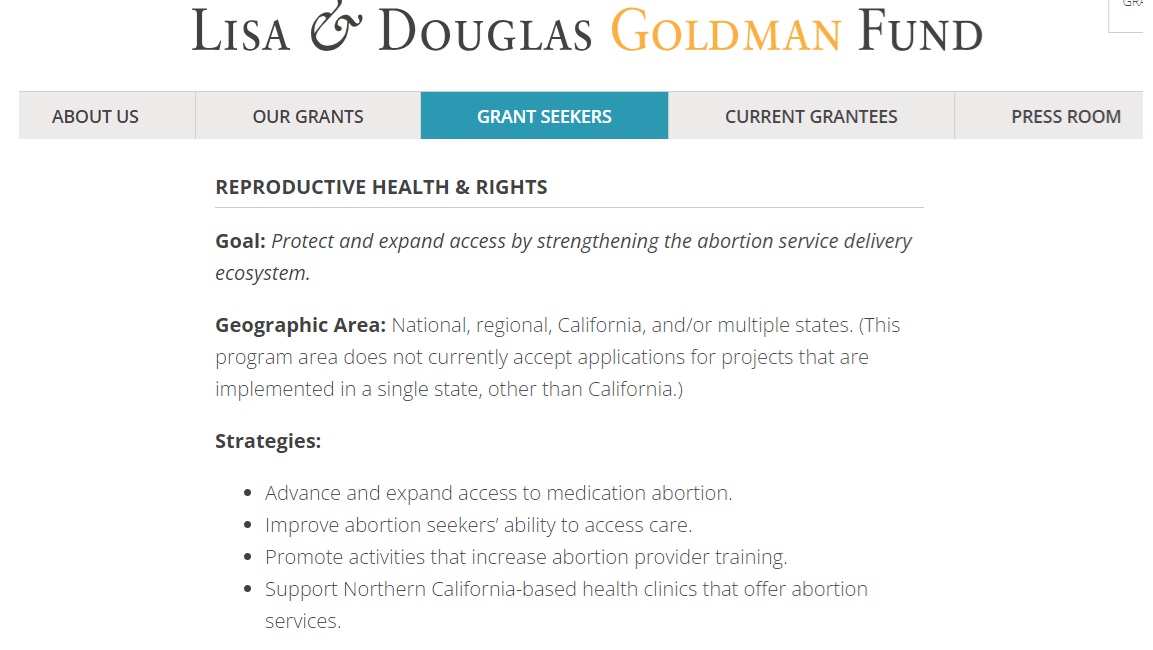
Lisa and Douglas Goldman Fund supports abortion
Pro-abortion Bias at the Journal ‘Nature Medicine’?
The primary handlers of the “Nature Medicine” study were “Editor: Sonia Muliyil and Jennifer Sargent, in collaboration with the Nature Medicine team,” the study claimed.
Yet, Sargent previously called a national pro-life organization a “prominent anti-choice medical group that pushes falsehoods about abortion risks.”
“As an editor, I’ve seen quite a few thinly veiled anti-abortion papers funded by ultra religious, pro-life organizations. It is the responsibility of journals, editors and reviewers to ensure these agendas are not promoted through biased scientific approaches,” Sargent wrote on Twitter “X” in 2019 (emphasis added). Apparently Sargent and her cohorts have no issue with pro-abortion organizations using biased scientific approaches?
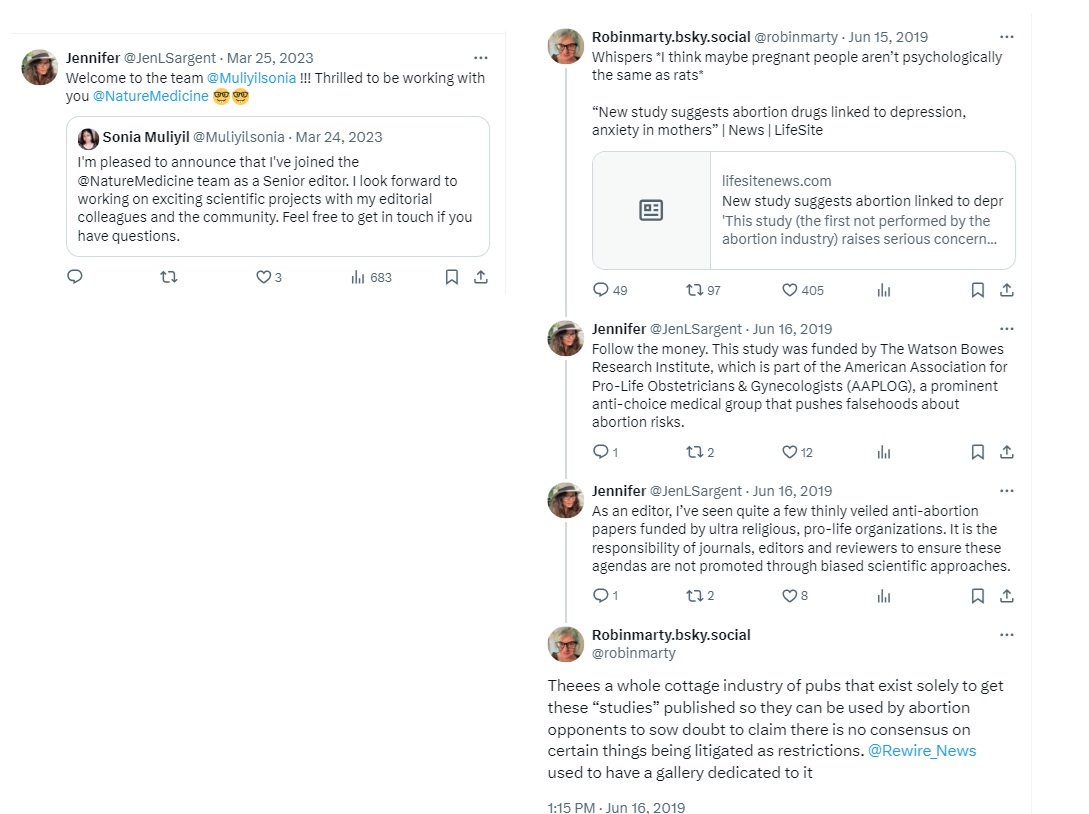
Nature Magazine editors on Twitter/X
This attitude extends to the journal itself — something Dr. Michael New caught in his analysis. “It should come as no surprise that a prestigious medical journal released a study claiming that telehealth abortions pose few health risks,” New wrote. “The timing of the release of this [telehealth] study is unsurprising. On March 26, the U.S. Supreme Court will hear oral arguments in a case about the regulation of chemical abortions.”
New added, “Last February, Nature published an editorial opposing this very litigation over FDA approval and regulation of chemical-abortion drugs.” In 2022, journal editors suggested the Supreme Court’s ruling in Dobbs v. Jackson which overturned Roe v. Wade “threatens the health of all Americans,” stating:
The right of all Americans to bodily autonomy and to personal health has never been so threatened….
Industries that claim to stand up for personal privacy and freedoms, that support diversity and equity, that are involved in healthcare in any form have the responsibility now to stand up, speak out and put their financial power to work to support legislative changes that ensure the reproductive rights and bodily autonomy of all American[s] are legally and durably protected.
Then, after Nature published the ANSIRH research, journal editor Saheli Sadanand wrote on Twitter/X that she was “Very proud that we have published this timely — in light of the upcoming Supreme Court decision on access to mifepristone — and important study on the safety of telehealth medical abortion…”
Very proud that we have published this timely — in light of the upcoming Supreme Court decision on access to mifepristone — and important study on the safety of telehealth medical abortion. Congrats to @UshmaU & all authors! #WomensHealth https://t.co/KmTwR271VY
— Saheli Sadanand (@SaheliSadanand) February 16, 2024
Live Action News has documented multiple times that incestuous funding by investors (Packard and Buffett Foundations) in the U.S. abortion pill manufacturer (Danco) and its generic equivalent (GenBioPro) is being funneled to sponsors of clinical trials, location sites, and journals publishing studies touting abortion pill safety.
In addition, Live Action News has exposed how multiple authors of abortion pill studies are on the payrolls of Danco and/or GenBioPro, and some authors belong to organizations which have been funded by the abortion pill manufacturer, as well.
But don’t expect the media or any of these allegedly unbiased scientific journals to call out these conflicts.







